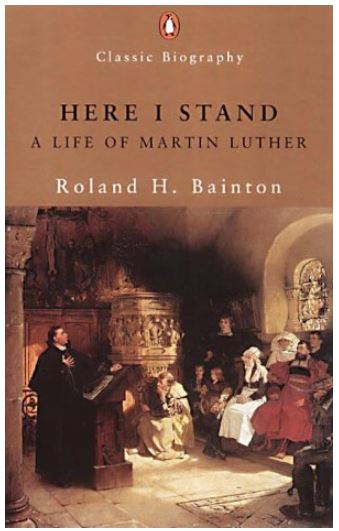"Unless I am convicted by Scripture and plain reason - I do not accept the authority of popes and councils, for they have contradicted each other - my conscience is captive to the Word of God. I cannot and I will not recant anything, for to go against conscience is neither right nor safe. God help me, Amen."
- Martin Luther
Here I Stand, A Life of Martin Luther by Roland Bainton (New York, New York: Meridian, 1995, 302 pages with bibliography, references, source of illustrations and index).
Many years ago, when first I began to read about the Reformation, I came across Roland Bainton's biography of Martin Luther and couldn't put it down. I thought then, and think to this day, that it is a classic on the subject of Martin Luther and the Reformation.
Born in England in 1894, Bainton lived most of his life in the United States, graduating from Yale University with a Ph.D., where he later served as the Titus Street Professor of Ecclesiastical History. With a background like that, readers it may be tempted to suppose that Bainton's writing, while scholarly, would have little appeal to the non-specialist. He would be half right. While it is true that Bainton was a gifted scholar, Here I Stand is anything but a dull read.
"' 'St. Anne help me! I will become a monk,' " are the first words we hear from Luther in Here I Stand. Always with a flair for the dramatic, Luther, the young university student, was returning to his studies at the University of Erfurt when he was knocked to the ground by a sudden lightening strike. Convinced by this that God was calling him to life in the monastery, Luther would abandon his secular studies to join the Augustinian order of monks.
As the Apostle Paul, whose teachings he would one day expound so well, Luther excelled many in zeal for his calling. Bainton quotes Luther thus, "I was a good monk, and I kept the rule of my order so strictly that I may say that if ever a monk got to heaven by his monkery it was I. All my brothers in the monastery who knew me will bear me out. If I had kept on any longer, I should have killed myself with vigils, prayers, reading, and other work."
As Bainton tells it, Luther was something of a holy terror in the confessional. "He confessed frequently," writes Bainton, often daily, and for as long as six hours on a single occasion. Every sin in order to be absolved was to be confessed...Luther would repeat a confession and, to be sure of including everything, would review his entire life until the confessor grew weary and exclaimed, 'Man, God is not angry with you. You are angry with God. Don't you know that God commands you to hope?' "
But while Luther's confessional zeal exasperated the poor brother unfortunate enough to be tasked with having to hear it, it was the young monk who had the correct understanding of God's holiness. In all this, God was teaching Luther the central tenant of Christianity, that justification comes not through the works of the law but through belief (faith) in Christ alone. Luther wrote, "I greatly longed to understand Paul's Epistle to the Romans and nothing stood in the way but that one expression, 'the justice of God'...Night and day I pondered until I saw the connection between the justice of God and the statement that 'the just shall live by his faith.' Then I grasped that the justice of God is that righteousness by which through grace and sheet mercy God justifies us through faith. Thereupon I felt myself to be reborn and to have gone through open doors into paradise. The whole of Scripture took on a new meaning, and whereas before the 'justice of God' had filled me with hate, now it became to me inexpressibly sweet in greater love. This passage of Paul became to me a gate to heaven...."
But if the words of Paul served as a gate to heaven for Luther, the reaction of the Roman Catholic Church to his subsequent activities would soon show him the earthly price of faithfulness to Christ.
As one who understood that a man is justified by faith in Christ alone, Luther soon found himself at odds with the practice of selling indulgences. Exactly one year before his famous act of nailing his 95 theses to the Wittenberg church door, on October 31, 1516 Luther preached against indulgences in the hearing of his prince, the Elector of Saxon. According to Bainton, indulgences "were the bingo of the sixteenth century," and to the extent that they brought in revenue to the Elector, Luther displeased the prince for pointing out the fraud.
Continuing with his discussion of indulgences, Bainton brings out the interesting occasion for Luther's jeremiad against the practice: the construction of St. Peter's in Rome. It strikes this author as no small irony that the construction of the single best-known symbol of papacy - St. Peter's Cathedral - actually served as the spark that helped to set off the Reformation. To hear Bainton tell it, Pope Julius II had commissioned the building of the edifice to replace an old wooden basilica dating from the time of Constatine, but had died before the work could be completed. In Bainton's words, "The piers [of St. Peter's] were laid; Julius died; the work lagged; weeds sprouted from the pillars; [Pope] Leo took over; he needed money."
And to where does a pope in need of money turn in his distress? To the "bingo of the sixteenth century" of course. That is to say, indulgences. And who better to hawk these indulgences than a certain Dominican by the name of John Tetzel, who seemed to be something of a sixteenth century Elmer Gantry. Tetzel had a marvelously effective sales pitch, in which he pleaded with his hearers to release their loved ones from the torments of purgatory through the purchase of indulgences, promising them, "As soon as the coin the coffer rings, the soul from purgatory springs."
All this was too much for Luther, who in response wrote his 95 theses, nailing them to the Wittenberg church door, October 31, 1517. Concludes Bainton, "Luther took no steps to spread his theses among the people. He was merely inviting scholars to dispute and dignitaries to define, but others surreptitiously translated the theses into German and gave them to the press. In short order they became the talk of Germany. What Karl Barth said said of his own unexpected emergence as a reformer could be said equally of Luther, that he was like a man climbing in the darkness a winding staircase in the steeple of an ancient cathedral. In the blackness he reached out to steady himself, and his hand laid hold of a rope. He was startled to hear the clanging of a bell."
There is, of course, much more to Here I Stand than can be discussed in this short review. Suffice it to say that this book is a classic of Reformation history, one that both informs and inspires. All those interested in Reformation history, whether a novice reader or a seasoned scholar, will find value in Bainton's work.





